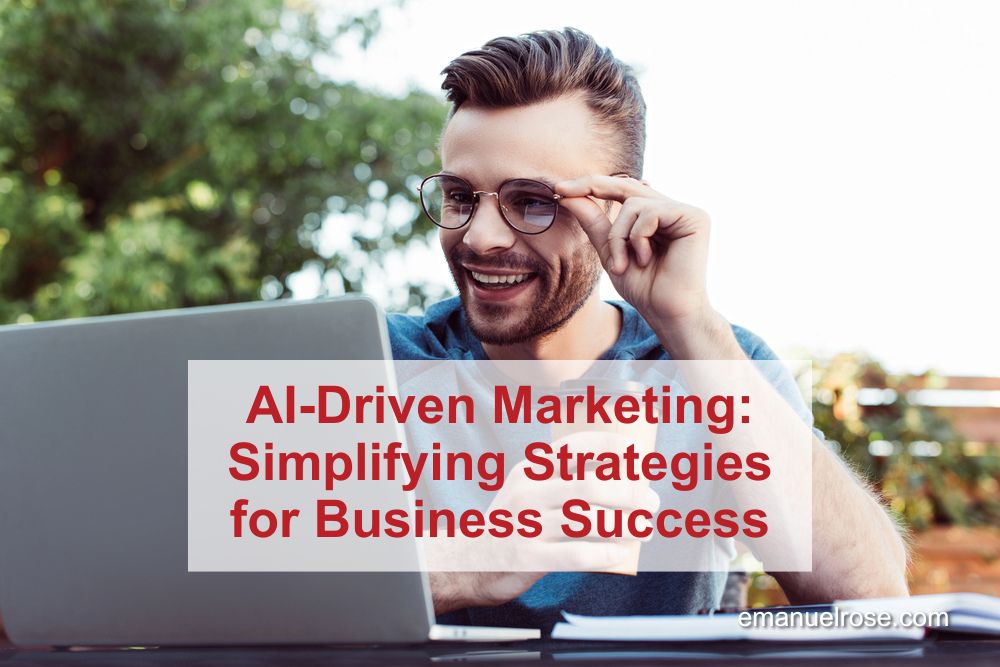Customer-Centric Marketing
A customer-first mindset is crucial for successful marketing. Understanding and addressing customer pain points should be the primary focus of any marketing strategy. This focus drives the development of tools that simplify marketing processes, making sophisticated strategies accessible even to those without extensive expertise.
Previous experiences with AI-based ventures have paved the way for current initiatives. The rapid advances in AI technologies have enabled the creation of tailored marketing experiences on a grander scale.
Personalization at Scale with AI
The goal is to empower businesses to generate customized marketing strategies using AI. Traditional software often lacks the flexibility to adapt dynamically to specific customer needs, but AI offers the potential for more tailored experiences. This adaptability allows businesses to align their marketing efforts more closely with audience demands.
The vision is to automate ad funnels, making complex marketing processes manageable for small business owners and entrepreneurs. This automation covers everything from creating ad content to optimizing performance, ensuring that effective strategies are implemented even without deep marketing knowledge.
Empathy plays a critical role in marketing. Understanding customer pain points and desires is essential. Effective communication involves conveying the value of a product in a way that resonates with the target audience.
Building Empathy into AI Marketing

Creating empathy through AI involves more than just inputting data. It requires an understanding of what questions to ask and how to frame these questions to get results that genuinely reflect customers’ needs and desires. The ability to mimic human intuition and perform deep analysis makes AI a powerful tool in crafting messages that connect emotionally with audiences.
For instance, empathy in messaging can mean the difference between a generic ad and one that speaks directly to a customer’s specific problem. AI can analyze past interactions, preferences, and feedback to tailor messages that resonate on a deeper level. This personalized approach can significantly increase engagement and conversion rates.
Effective Use of Data in AI-Driven Marketing
Data is vital for creating effective marketing strategies. By analyzing various data points, marketers can craft messages that resonate more with their audience. Key aspects such as understanding customer desires, expected outcomes from a product, and demographic information help fine-tune messaging and targeting.

Automating ad funnels for platforms like Meta and Instagram involves the use of multiple data points. Analyzing a business’s website and description enables AI systems to generate tailored ad campaigns quickly. This automation extends to ad creative, video scripts, and performance optimization, ensuring precise targeting and efficient resource use.
Data-driven decision-making is not just about the volume of data but how it’s interpreted and applied. AI helps in making sense of large datasets by identifying patterns and trends that might not be apparent through traditional analysis methods. These insights allow for more accurate targeting and more effective marketing campaigns, ensuring that efforts are reaching the right audience at the right time.
Moreover, the integration of AI in data analysis allows for continuous learning and improvement. As more data is collected, AI systems become better at predicting outcomes and suggesting optimizations, leading to progressively better marketing performance over time. This continuous feedback loop ensures that marketing strategies can adapt and evolve, staying relevant and effective.
Future Innovations and Developments
Constant experimentation with new AI models and integrations is essential for enhancing product offerings. One significant upcoming development is automating Google ad funnels. This involves strategies around high-intent keywords, competitive analysis, and customer-specific messaging. The goal is to lower acquisition costs while maintaining engagement consistency.
Moreover, maintaining messaging consistency across various touchpoints is a critical focus. This involves understanding the customer’s stages of awareness and creating strategies that keep engagement meaningful and cohesive.
Future innovations are not limited to just expanding ad platforms. There is an ongoing effort to integrate more sophisticated AI capabilities that can handle even more complex marketing tasks. For example, predictive analytics can forecast future trends and customer behaviors, allowing businesses to proactively adjust their strategies.
Another area of development is enhancing customer interactions through AI-driven chatbots and virtual assistants. These tools can provide instant responses to customer inquiries, offer personalized recommendations, and even complete transactions. By automating these interactions, businesses can provide better customer service and free up human resources for more strategic tasks.
Support for Solopreneurs and Small Businesses

A standout feature is the ability to make advanced marketing strategies accessible to solopreneurs and small businesses. Automating intricate processes allows business owners to focus on core activities while seamlessly implementing effective strategies.
Extensive experience and a commitment to user-friendly solutions are vital to the success of these AI advancements. The aim is to provide a powerful tool that scales and evolves with the business, catering to marketers at all levels.
AI-driven marketing tools are especially beneficial for smaller businesses that may not have the resources for a full-fledged marketing team. By automating tasks such as ad creation, targeting, and performance monitoring, these tools allow small businesses to compete on a level playing field with larger companies.
Moreover, the scalability of AI solutions means that as a small business grows, its marketing strategies can grow with it. This flexibility ensures that businesses can continue to benefit from AI-driven insights and optimizations, regardless of their size.
AI is transforming the marketing landscape by making expert strategies practical and manageable for businesses of all sizes. With automated ad funnels and customized marketing capabilities, AI is driving growth and efficiency like never before.

